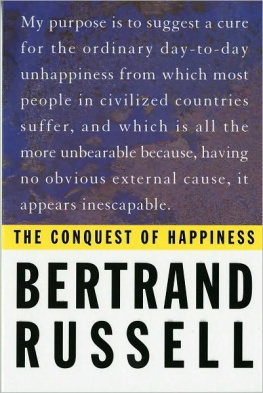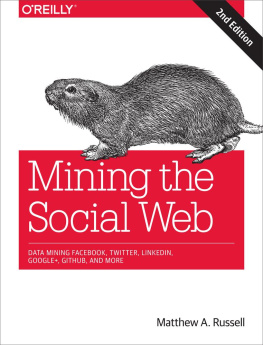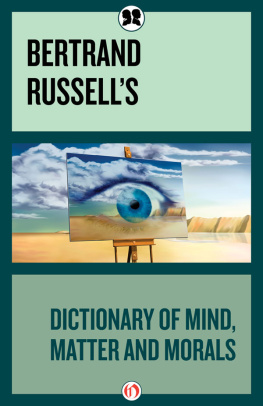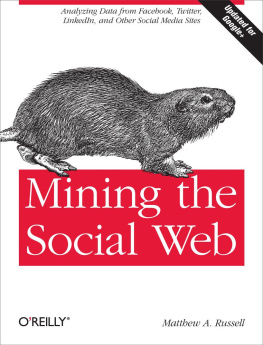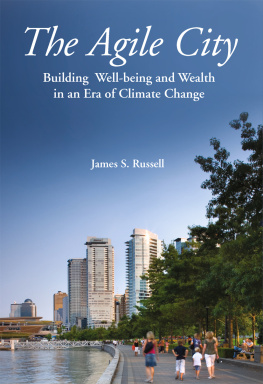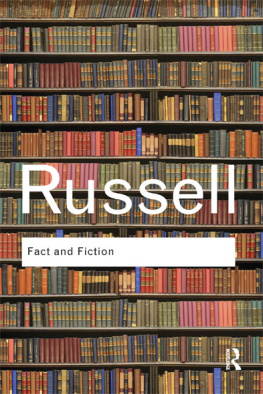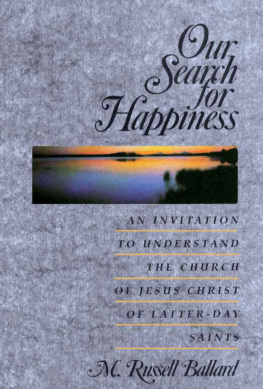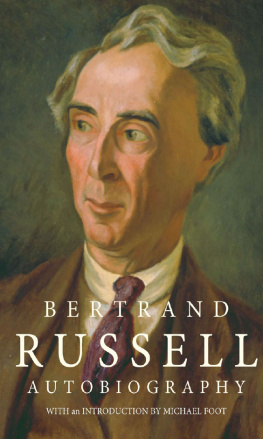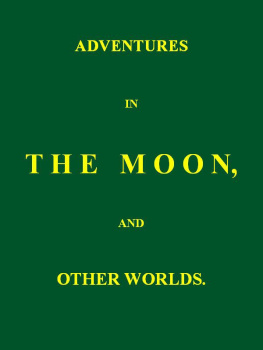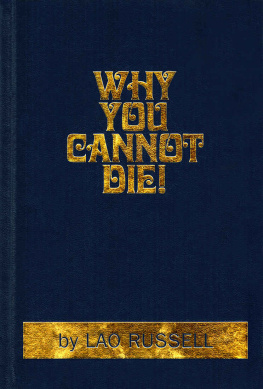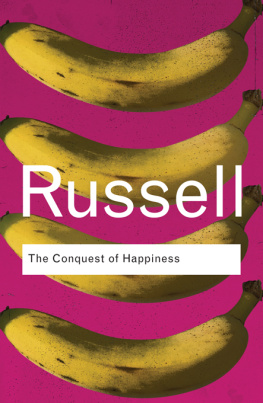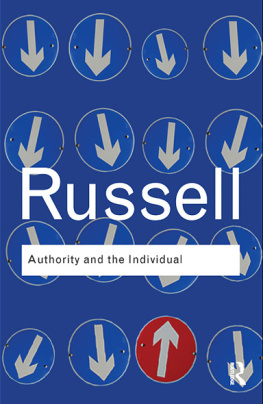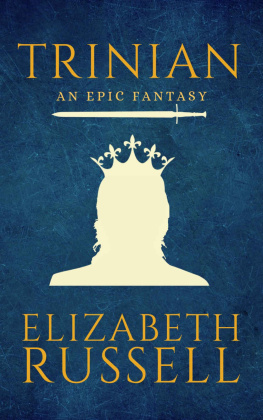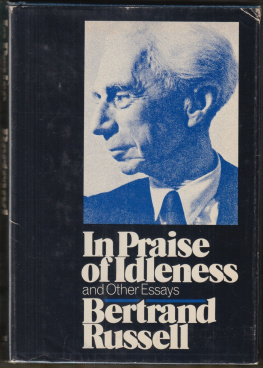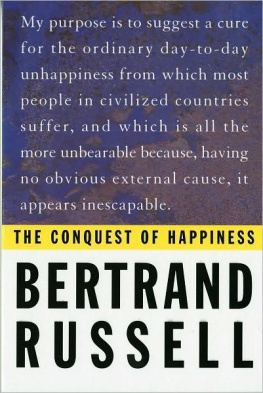Russell - The conquest of happiness
Here you can read online Russell - The conquest of happiness full text of the book (entire story) in english for free. Download pdf and epub, get meaning, cover and reviews about this ebook. City: New York, year: 1930, publisher: H. Liveright, genre: Science. Description of the work, (preface) as well as reviews are available. Best literature library LitArk.com created for fans of good reading and offers a wide selection of genres:
Romance novel
Science fiction
Adventure
Detective
Science
History
Home and family
Prose
Art
Politics
Computer
Non-fiction
Religion
Business
Children
Humor
Choose a favorite category and find really read worthwhile books. Enjoy immersion in the world of imagination, feel the emotions of the characters or learn something new for yourself, make an fascinating discovery.
The conquest of happiness: summary, description and annotation
We offer to read an annotation, description, summary or preface (depends on what the author of the book "The conquest of happiness" wrote himself). If you haven't found the necessary information about the book — write in the comments, we will try to find it.
The conquest of happiness — read online for free the complete book (whole text) full work
Below is the text of the book, divided by pages. System saving the place of the last page read, allows you to conveniently read the book "The conquest of happiness" online for free, without having to search again every time where you left off. Put a bookmark, and you can go to the page where you finished reading at any time.
Font size:
Interval:
Bookmark:
It is common in our day, as it has been in many other periods of the worlds history, to suppose that those among us who are wise have seen through all the enthusiasms of earlier times and have become aware that there is nothing left to live for. The men who hold this view are genuinely unhappy, but they are proud of their unhappiness, which they attribute to the nature of the universe and consider to be the only rational attitude for an enlightened man. Their pride in their unhappiness makes less sophisticated people suspicious of its genuineness; they think that the man who enjoys being miserable is not miserable.
This view is too simple; undoubtedly there is some slight compensation in the feeling of superiority and insight which these sufferers have, but it is not sufficient to make up for the loss of simpler pleasures. I do not myself think that there is any superior rationality in being unhappy. The wise man will be as happy as circumstances permit and if he finds the contemplation of the universe painful beyond a point, he will contemplate something else instead. This is what I wish to prove in the present chapter. I wish to persuade the reader that, whatever the arguments may be, reason lays no embargo upon happiness; nay, more, I am persuaded that those who quite sincerely attribute their sorrows to their views about the universe are putting the cart before the horse: the truth is that they are unhappy for some reason of which they are not aware, and this unhappiness leads them to dwell upon the less agreeable characteristics of the world in which they live.
It is fortunate for literary men that people no longer read anything written long ago, for if they did they would come to the conclusion that, whatever may be said about pools of water, the making of new books is certainly vanity. If we can show that the doctrine of Ecclesiastes is not the only one open to a wise man, we need not trouble ourselves much with the later expressions of the same mood.
In an argument of this sort we must distinguish between a mood and its intellectual expression. There is no arguing with a mood; it can be changed by some fortunate event, or by a change in our bodily condition, but it cannot be changed by argument. I have frequently experienced myself the mood in which I felt that all is vanity; I have emerged from it not by means of any philosophy, but owing to some imperative necessity of action.
If your child is ill, you may be unhappy, but you will not feel that all is vanity; you will feel that the restoring of the child to health is a matter to be attended to regardless of the question whether there is ultimate value in human life or not. A rich man may, and often does, feel that all is vanity, but if he should happen to lose his money, he would feel that his next meal was by no means vanity.
The feeling is one born of a too easy satisfaction of natural needs. The human animal, like others, is adapted to a certain amount of struggle for life, and when by means of great wealth homo sapiens can gratify all his whims without effort, the mere absence of effort from his life removes an essential ingredient of happiness. The man who acquires easily things for which he feels only a very moderate desire concludes that the attainment of desire does not bring happiness. If he is of a philosophic disposition, he concludes that human life is essentially wretched, since the man who has all he wants is still unhappy. He forgets that to be without some of the things you want is an indispensable part of happiness.
So much for the mood. There are, however, also intellectual arguments in Ecclesiastes.The rivers run into the sea; yet the sea is not full.
There is no new thing under the sun.
There is no remembrance of former things.
I hated all my labour which I had taken under the sun: because
I should leave it unto the man that shall be after me.
If one were to attempt to set up these arguments in the style of a modern philosopher they would come to something like this: Man is perpetually toiling, and matter is perpetually in motion yet nothing abides, although the new thing that comes after it is in no way different from what has gone before. A man dies, and his heir reaps the benefits of his labours; the rivers run into the sea, but their waters are not permitted to stay there. Over and over again in an endless purposeless cycle men and things are born and die without improvement, without permanent achievement, day after day, year after year. The rivers, if they were wise, would stay where they are. Solomon, if he were wise, would not plant fruit trees of which his son is to enjoy the fruit.
But in another mood how different all this looks. No new thing under the sun? What about skyscrapers, aeroplanes, and the broadcast speeches of politicians? What did Solomon know about such things? Ecclesiastes was not, of course, really written by Solomon, but it is convenient to allude to the author by this name) If he could have heard on the wireless the speech of the Queen of Sheba to her subjects on her return from his dominions, would it not have consoled him among his futile trees and pools? If he could have had a press-cutting agency to let him know what the newspapers said about the beauty of his architecture, the comforts of his harem, and the discomfitures of rival sages in argument with him, could he have gone on saying that there is no new thing under the sun? It may be that these things would not have wholly cured his pessimism, but he would have had to give it a new expression. Indeed, one of Mr Krutchs complaints of our time is that there are so many new things under the sun. If either the absence or the presence of novelty is equally annoying, it would hardly seem that either could be the true cause of despair. Again, take the fact that all the rivers run into the sea, yet the sea is not full; unto the place from whence the rivers come, thither they return again. Regarded as a ground for pessimism, this assumes that travel is unpleasant. People go to health resorts in the summer, yet return again unto the place whence they came. This does not prove that it is futile to go to health resorts in the summer. If the waters were endowed with feeling, they would probably enjoy the adventurous cycle after the manner of Shelleys Cloud. As for the painfulness of leaving things to ones heir, that is a matter that may be looked at from two points of view: from the point of view of the heir it is distinctly less disastrous. Nor is the fact that all things pass in itself any ground for pessimism. If they were succeeded by worse things, that would be a ground, but if they are succeeded by better things, that is a reason for optimism. What are we to think if, as Solomon maintains, they are succeeded by things exactly like themselves? Does not this make the whole process futile? Emphaticany not, unless the various stages of the cycle are themselves painful. The habit of looking to the future and thinking that the whole meaning of the present lies in what it will bring forth is a pernicious one. There can be no value in the whole unless there is value in the parts. Life is not to be conceived on the analogy of a melodrama in which the hero and heroine go through incredible misfortunes for which they are compensated by a happy ending. I live and have my day, my son succeeds me and has his day, his son in turn succeeds him. What is there in all this to make a tragedy about? On the contrary, if I lived for ever the joys of life would inevitably in the end lose their savour. As it is, they remain perennially fresh.
I warmed both hands before the fire;It sinks, and I am ready to depart.
This attitude is quite as rational as that of indignation with death. If, therefore, moods were to be decided by reason, there would be quite as much reason for cheerfulness as for despair.
Font size:
Interval:
Bookmark:
Similar books «The conquest of happiness»
Look at similar books to The conquest of happiness. We have selected literature similar in name and meaning in the hope of providing readers with more options to find new, interesting, not yet read works.
Discussion, reviews of the book The conquest of happiness and just readers' own opinions. Leave your comments, write what you think about the work, its meaning or the main characters. Specify what exactly you liked and what you didn't like, and why you think so.

